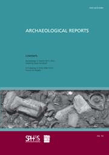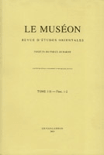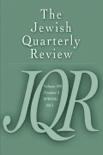
Jahrbuch der Oesterreichischen Byzantinistik
metrics 2024
Navigating the intricate world of Byzantine literature and archaeology.
Introduction
Jahrbuch der Oesterreichischen Byzantinistik, published by the esteemed Österreichische Akademie der Wissenschaften, is a vital academic journal dedicated to advancing the study of Byzantine studies, history, and related fields. Situated in Austria, this journal serves as a critical platform for scholars and researchers, offering a rich collection of articles that reflect the diverse aspects of Byzantine culture, literature, and archaeological findings. Despite its recent categorization in the Q4 quartile in areas such as Archaeology, History, and Literary Theory, it commands impressive rankings within Scopus, particularly in Literature and Literary Theory at the 87th percentile, highlighting its growing impact in the arts and humanities. Researchers and professionals can access comprehensive studies that span from 2010 to 2018 and continue from 2020 to 2023, paving the way for interdisciplinary dialogue and exploration within the Byzantine field. As a continually evolving resource, the Jahrbuch is essential for those committed to deepening their understanding of this historically rich domain.
Metrics 2024
 0.10
0.10 -
- -
- 9
9Metrics History
Rank 2024
Scopus
JCI (Web Of Science)
Quartile History
Similar Journals

Studia Ceranea
Exploring Cultural Narratives and Historical ContextsStudia Ceranea is an esteemed academic journal published by WYDAWNICTWO UNIWERSYTETU LODZKIEGO, dedicated to advancing research in the fields of Cultural Studies, History, and Religious Studies. With an ISSN of 2084-140X and an E-ISSN matching, this journal has been a pivotal platform for scholarly dialogue since its establishment, now enjoying an Open Access format since 2016, which fosters greater accessibility of its articles. Based in Poland, Studia Ceranea has witnessed significant convergence, with publication efforts spanning from 2011 to 2024. The journal's current standing is reflected in its quartile rankings, placing it in the Q4 category for 2023 across Cultural Studies, History, and Religious Studies. Additionally, it sits at rank #1124 in History and #414 in Religious Studies within Scopus ranks, evidencing its role in the wider academic landscape. Researchers, professionals, and students alike are encouraged to engage with this journal as it continues to explore and illuminate critical themes within the humanities and social sciences.

Archaeological Reports-London
Delving Deep into the Richness of Human HistoryArchaeological Reports-London, published by Cambridge University Press, is a prominent journal dedicated to advancing the field of archaeology, encompassing a comprehensive range of studies that delve into the rich tapestry of human history from prehistory to modern times. With an ISSN of 0570-6084 and an E-ISSN of 2041-4102, this journal has been a significant source of scholarly articles since its inception in 1955, serving as a crucial platform for researchers and academics alike. The journal is categorized in the third quartile for Archaeology and Arts and Humanities, and holds a prestigious position in the first quartile for Classics, reflecting its vital role in the scholarly community. With its esteemed ranking of Rank #45/170 in Classics and Rank #210/413 in Archaeology, it provides unparalleled insights and findings that shape contemporary archaeological discourse. Although not an open-access publication, the journal remains key for those who seek to enrich their understanding of archaeological practices and heritage conservation. Engage with Archaeological Reports-London to explore cutting-edge research that illuminates our understanding of past civilizations and informs future directions in the field.

Magnificat Cultura i Literatura Medievals
Unveiling the Rich Tapestry of Medieval ScholarshipMagnificat Cultura i Literatura Medievals, published by UNIV VALENCIA, SERVICIO PUBLICACIONS, is an esteemed academic journal that has been at the forefront of medieval studies since its inception in 2014. With its Open Access model, this journal ensures that cutting-edge research is readily available to scholars and enthusiasts alike, fostering an inclusive academic environment. Based in Spain, it boasts impressive rankings with a Q2 designation in History and a Q1 in Literature and Literary Theory for 2023, indicating its significant contribution to these fields. The journal is indexed by Scopus, achieving top-tier rankings in both Literature and History, and is recognized in the 87th and 72nd percentiles of their respective categories. With a focus on the complexities of medieval culture and literature, Magnificat serves as a vital resource for researchers, professionals, and students dedicated to exploring the rich tapestry of medieval scholarship.

ZEITSCHRIFT FUR RELIGIONS-UND GEISTESGESCHICHTE
Investigating the Intersections of Culture, Faith, and IdeologyZEITSCHRIFT FUR RELIGIONS-UND GEISTESGESCHICHTE is a prominent academic journal published by BRILL, focusing on the intricacies of religious and intellectual history. Since its inception in 1929, this journal has provided a key platform for scholarly discourse, offering insights into the historical evolution of religious beliefs and philosophical thought. Although it currently holds a Q4 ranking in the fields of History, Philosophy, and Religious Studies according to the 2023 category quartiles, it serves as an important resource for researchers and students alike who are engaged in these disciplines. With an ISSN of 0044-3441, the journal strives to foster academic dialogue and critical analysis, contributing to the understanding of how religious and philosophical ideologies shape human experience. The journal is based in Leiden, Netherlands, and while it does not currently offer open access, it supports the academic community by providing essential research articles that are invaluable for those exploring the intersections of faith, culture, and thought.

Hagiographica
Decoding the Narratives that Shape Cultural IdentityHagiographica, published by SISMEL EDIZIONI GALLUZZO in Italy, is a prominent scholarly journal dedicated to the study of hagiography and religious history. As an established platform for researchers and scholars, it explores the rich tapestry of religious narratives and their implications on cultural identity and societal values, contributing significantly to the fields of History and Religious Studies. Despite its current ranking in the Q4 quartile for both fields according to the 2023 category rankings, Hagiographica has continued to provide critical insights and research findings that stimulate scholarly discourse. Although it operates under a traditional subscription model and does not offer open access, the journal's commitment to rigorous peer-review and high-quality publications ensures that it remains a vital resource for professionals and students alike seeking to deepen their understanding of religious texts and their historical contexts. This journal is indispensable for those aiming to uncover the nuanced intersections of faith, culture, and narrative.

Museon
Charting the Course of Scholarly ExplorationMuseon, published by PEETERS in Belgium, is a prominent academic journal dedicated to exploring the interconnected realms of History, Linguistics, Literature, and Religious Studies. With an ISSN of 0771-6494 and an E-ISSN of 1783-158X, this journal has been a reliable source of scholarly discourse since its inception in 1972, with coverage extending from 1976 to 2023. While the journal does not offer open access, it maintains a respectable reputation, as evidenced by its category quartile rankings in 2023, positioning it in Q2 for Literature and Literary Theory and Q3 for the other disciplines. Researchers and students in these fields will find Museon to be an essential platform for disseminating and engaging with innovative and critical analyses. The journal's commitment to high-quality scholarship is reflected in its diverse scope and its ongoing contribution to the humanities, making it a vital resource for advancing knowledge and fostering academic dialogue.

Journal for the Study of Judaism
Cultivating Insight into the Jewish ExperienceJournal for the Study of Judaism, published by BRILL, serves as a vital platform for scholarly discourse in the fields of History, Literature and Literary Theory, and Religious Studies. With a commendable impact factor and ranking in the Q2 and Q3 quartiles across its respective categories, this journal facilitates high-quality research that explores the multi-faceted dimensions of Jewish studies from its inception in 1970 to the present day. For those who engage with the journal, the commitment to rigorous peer-review processes ensures publication of significant articles that advance knowledge and foster discussions within the academic community. As an essential resource for researchers, professionals, and students alike, the journal continues to enrich the understanding of Judaism through esteemed contributions of scholarship and critical analysis. The journal’s rich legacy and commitment to excellence make it an indispensable tool for those seeking to deepen their insight into Jewish studies and its broader implications.

Vizantiiskii Vremennik
Unveiling the Secrets of Byzantine CivilizationVizantiiskii Vremennik is a prestigious academic journal dedicated to the field of Byzantine studies, published by the esteemed ROSSIISKAYA AKAD NAUK, IZDATELSTVO NAUKA. With its ISSN 0132-3776, this journal serves as a vital platform for scholarly discourse, exploring the rich historical, cultural, and artistic legacy of the Byzantine Empire. Despite the absence of open access options, Vizantiiskii Vremennik provides valuable insights through meticulously peer-reviewed articles, making it essential reading for researchers, historians, and students engaged in classical studies and related disciplines. The journal prides itself on fostering a deeper understanding of Byzantine civilization, promoting interdisciplinary approaches, and contributing to the broader research community dedicated to this pivotal era in history. The publication's commitment to high academic standards ensures its importance in the scholarly landscape, making it a recommended source for anyone pursuing knowledge in this influential field.

GREEK ROMAN AND BYZANTINE STUDIES
Innovating Research on the Foundations of Western CivilizationGREEK ROMAN AND BYZANTINE STUDIES, published by DUKE UNIVERSITY, is a leading journal dedicated to the exploration of ancient Greek and Roman civilizations as well as Byzantine history. With its ISSN 0017-3916 and E-ISSN 2159-3159, this prestigious journal has established itself as a vital platform for interdisciplinary research, boasting an impact factor worthy of recognition in the academic community. Since its transition to Open Access in 2004, GREEK ROMAN AND BYZANTINE STUDIES has enhanced the accessibility of scholarly work, fostering a collaborative environment for researchers, students, and professionals alike. Ranked in the Q2 category in Classics and History, and Q3 in Cultural Studies, this journal continues to be an essential resource for those investigating the philosophical, historical, and cultural dimensions of ancient societies. With a focus on innovative research and critical scholarship, GREEK ROMAN AND BYZANTINE STUDIES stands as a cornerstone for advancing knowledge and understanding within these influential fields.

JEWISH QUARTERLY REVIEW
Charting New Territories in Jewish StudiesJewish Quarterly Review, published by University of Pennsylvania Press, is a distinguished academic journal that delves into the multifaceted realms of Jewish culture, history, and religious studies. With a rich publication history dating back to 1953 and an impressive track record of rigorous scholarship, this journal maintains a Q2 ranking in key categories such as Cultural Studies, History, and Religious Studies in 2023, placing it among the top-tier journals in its field. The ISSN number 0021-6682 and the E-ISSN 1553-0604 ensure that its scholarship is widely accessible and traceable in academic databases. While the journal is not open access, it remains an essential resource for researchers, professionals, and students seeking in-depth analysis and perspectives on Jewish thought and heritage. The JQR is known for its editorial commitment to enhancing understanding and dialogue across cultural and historical contexts, making it an invaluable asset for anyone engaged in Jewish studies and related disciplines. With its headquarters in Philadelphia, PA, the journal continues to foster scholarly engagement and critical discourse on Jewish identity and experience through its carefully curated articles and reviews.